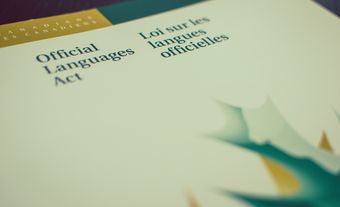Quebec Family Policy
In accordance with the Canadian Constitution, the governance of health and welfare services falls to the provinces. However, to ensure equity between the provinces and standardization of assistance to citizens the federal government has used a co-financing formula since the 1920s. Thus, several cost-sharing programmes were put in place over the years. From the outset, Québec was resistant to sharing its areas of jurisdiction and exercised its right to withdraw when the opportunity arose. Among the many measures associated with family policy several reflect this federal-provincial interaction.
Historic Landmarks
In 1967, Québec created its own family allowance plan. Some ten years later, the government opened day-care spaces, then, in 1979, instituted maternity benefits and implemented la Loi sur les services de garde à l'enfance (childcare services act). The year 1984, marked the start of a series of initiatives: publication of the Green Paper on Family Policy; extensive consultation with the people and groups concerned; and the creation of the Secrétariat à la politique familiale (later the Secrétariat à la famille). The Secrétariat was responsible for drawing up family policy and seeing to its enforcement through various means of government intervention (housing, education, recreation, health, taxation, law, etc.) In 1987, the government published l'Énoncé d'orientation en matière de politique familiale, and the next year created the Conseil de la famille, an advisory body for its minister. The government's role from then on was clearly defined: to support parents, who were mainly responsible for a child's welfare. In subsequent years, three action plans were adopted, extending from 1989 to 1997. The first, instituted by the Liberals, differs from the others by its clearly pro-natalist design and did not experience the anticipated success. The 1992 and1994 action plans considered problems engendered by poverty and the difficulty of mothers, especially those with small children, in re-entering the work force full time.
New Measures
In the fall of 1996, the Parti Québécois government announced three new measures: the introduction of a new family allowance, the development of early childhood education and day care services, and the creation of a new parental insurance scheme. In 1997, the government created the Ministère de la Famille et de l'enfance and set out to implement the proposed measures.
The government grants its financial support through family benefits, tax measures and various programmes. It hopes, in this way, to keep poverty in check for some families, particularly single-parent families. The assistance, in the form of family allowances, tax assistance, work revenue supplements, or housing allowances is intended as an incentive to remain in the work force or return to work. The new family allowance, based on and supplementing the Canadian Child Tax Benefit, replaces the former plan. It responds to the basic needs of children as recognized by taxation. On the taxation front, non-refundable tax credits recognize the universal dimension of family assistance, while refundable credits target specific situations. Tax reduction for families is addressed to low or middle income workers with dependent children. Programs for Parental Wage Assistance (PWA) and housing allowances target disadvantaged families.
In order to facilitate the reconciliation of parental and professional responsibilities, encourage vocational reintegration, and stimulate disadvantaged children, the government gradually introduced a network of early childhood services for children up to 4 years old, beginning in September 1997. According to parents' needs, these services offer full or part-time day care at centres or in a family environment at the cost of $5 a day to a maximum of 10 hours per day, 261days a year. Linked to income security reform, parents receiving this support have free access to childcare for 23 1/2 hours per week, which, in special cases, can be extended. Low-income workers benefitting from the PWA program receive a refund of at most $3 a day. For a maximum of $5 a day, childcare services are available to children in kindergarten and primary school within the public system, or in early childhood centres with space for this purpose. Finally, full time kindergarten is free to all children aged 5 as of September 1997. It is estimated that 98.8% of children 5 years old in Québec attend kindergarten. From September 1998, on the island of Montréal, part time kindergarten has been offered to children 4 years old if disabled or from low-income families. This combined network of childcare services places Québec in the forefront of Canadian provinces on this matter.
Taking the evolution of the labour force into account (increase in independent or part- time employment or other irregular work methods), the government decided to review maternity and parental leave, wanting in this way to support and promote birth and adoption. However, the introduction of a new plan is dependent on negotiations with the federal government as regards transfer payments related to maternity and parental leave. Therefore, this issue is a point of dispute between the two levels of government.
Family Policy or Policy for the Fight against Poverty?
Québec family policy includes a combination of measures for family welfare. However, these measures have changed through the decades according to the economic context. Thus, since the late 1980s, we have witnessed an increase in selective measures aimed at disadvantaged families, to the detriment of universality. Federal budgetary cutbacks, particularly in provincial transfers, have obliged Québec to decrease its support for social programmes. The new family policy measures established in 1997 were written with a very clear vision: to attain a zero deficit in 2000. This led to incentive measures for remaining in or re-entering the work force. Widely accessible childcare, although a long-standing demand by the woman's movement, must be seen from this perspective. Therefore, it is interesting to note that even within the state apparatus in Québec the Conseil du statut de la femme (CSF), who give it significant weight, has represented this shift since 1973. Yet, for the CSF as for the Conseil de la famille, family policy must be distinguished from anti-poverty politics and be addressed to all families regardless of income. Society can, in this way, acknowledge the time and money invested in raising children. (SeeDAYCARE.)

 Share on Facebook
Share on Facebook Share on X
Share on X Share by Email
Share by Email Share on Google Classroom
Share on Google Classroom


